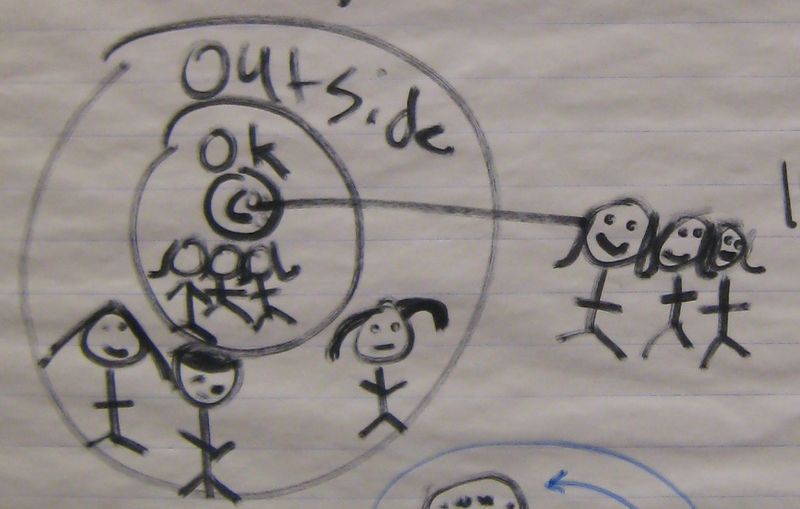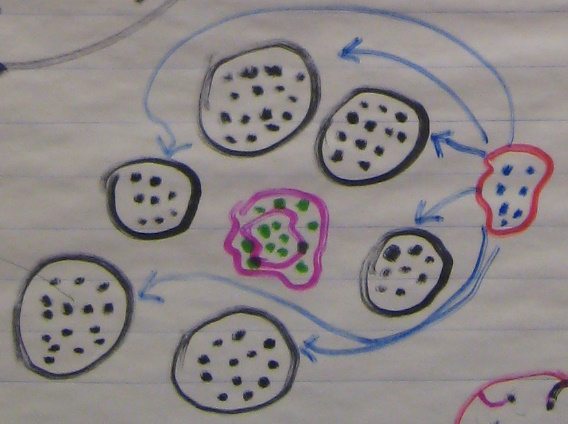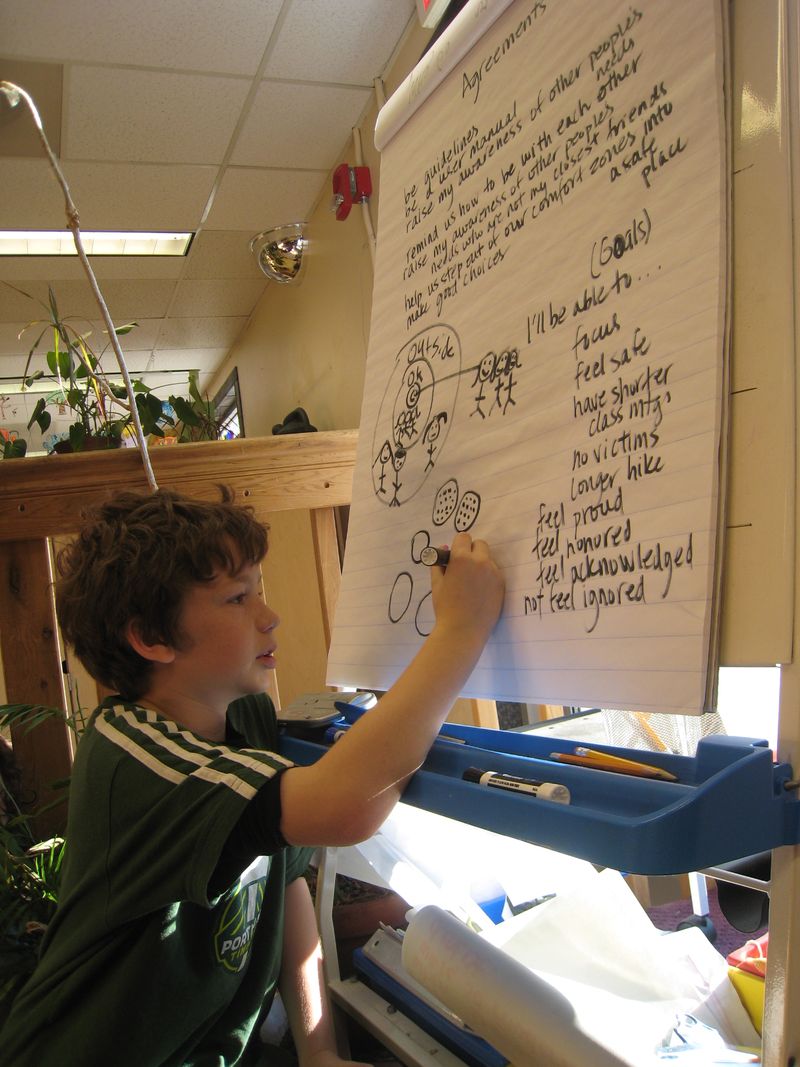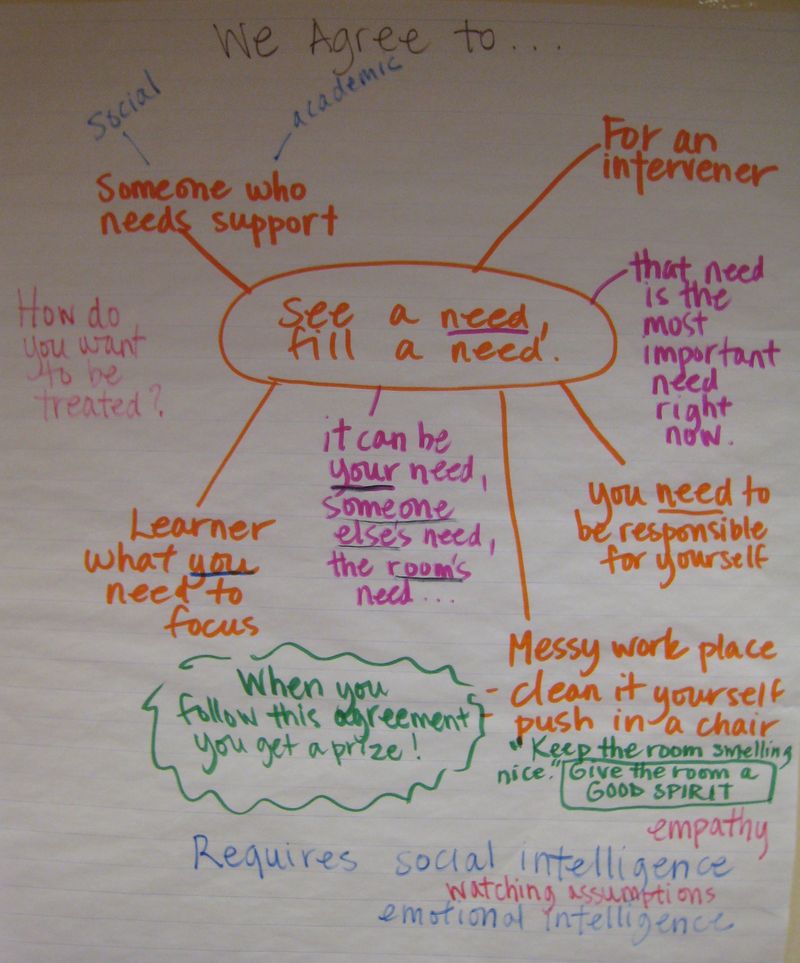See a need, Fill a need

Opal 4 has been working for almost three weeks on taking our lists of needs each of us has, as learners, community members, friends, and stewards of our classroom space and boiling them down into three or four powerful statements that will be our classroom agreements for the rest of the year.
A few days ago, we discussed the reasons for having class agreements in the first place.
Here is a snippet of that conversation:
NF: Agreements might help us step out of our comfort zones into a safe place
NF was referring to stepping outside of our usual group of friends to be with other people. This led to students offering their ideas and theories on comfort zones and how "friend groups" (cliques) operate in fifth grade.
EY drew this on our chart:
EY: When you step outside your comfort zone, you meet new people and mingle. In the okay zone you have some friends, so it’s okay there, and inside your comfort zone, it’s just your best friends. After you meet new people they can move into your okay zone and even your comfort zone. Those zones get bigger.
MM drew this picture:
MM: I learned this from Judy Graves. These [black circles with dots as people inside] are the friend groups. They all have something in common like, Harry Potter, sports, they love math, they like to draw, they like to play tag, then the groups in the pink blob and the red blob are different. One is a group of people who can go in and out of other groups, but they don't stay there, and one is a group of people that don't fit anywhere at all. They just stand out and watch.
AW: For the past year there have been about that many groups in our class. Should we really have that many?
RC: There should be just one group. We are one community.
RC: There are protagonists in every group who never leave their comfort zone. All of their followers don’t leave their comfort zone either. In each group there is a protagonist who’s not always right. People won’t want to leave their comfort zone ever because those are just their friends, period, period, period.
ET: If everybody found a little bit of how they’re sort of alike then they might be friends. They could be friends, they choose not to be. It’s like there is a river, and on one side of the river are the girls and the boys are on the other side. There is a bridge, they choose never to cross it.
The conversation did not end here. Many students offered their idea of what this sort of classroom looks like and why it is the way it is. I found myself in that enviable position we Opal teachers sometimes find ourselves in where our students are leading our learning somewhere powerful and important in ways we adults did not predict. And while we will follow up on this work as a community, we still needed to make some progress on our class agreements. So, on the advice of Mary Gage, I decided to ask the class to “hammer out” an agreement that would seem obvious and familiar to them; one that they may have had in past years at Opal. I asked them to start with an agreement around being “stewards of our classroom space.”
One table group volunteered to share their Powerful Statement for this agreement:
See a need, fill a need
MC: It’s really simple, see a need, fill a need. If you see something that needs to be done, then just do it. That could be for anything, like if you see a messy work place you can just clean it yourself. If you see a need for an intervener, you can intervene. And it can even cover more things. Will you read the one we wrote about a leaner?
“Find out what you need to focus.”
MC: So you should know your needs as a learner and fill them.
Levia: Wow, if we really agree to this, it will change everything. If everyone is really looking for needs that need to be filled all of the time, we will have to be looking outward all the time, scanning for needs. That is huge. What do you think? Is this something we all want to agree to? Can you think of a time when this will be hard for you to keep this agreement? Let’s share them now so that we can have some strategies to help us be successful in keeping it.
NF: It’s going to be hard to clean up after people.
MC: If we agree to “see a need, fill a need,” people won’t leave messes, people will clean up after each other. It will become just what we do.
AW: Let’s say you’re playing your favorite game with your friend and I see someone who is not happy in the sandbox. I have to fill their need, but I want to play. Like say it’s Friday and we won’t have outdoor break again until Monday. I don’t want to spend my time filing their need. Well, I guess I could ask my friends to pause the game or I could have my friends come over with me to invite that person to play. Their need is the most important need right now!
Levia: I love your idea of having all of your friends come with you to invite that person to play. Then you all get to share that feeling of getting a prize when you fill someone else’s need.
MM: You might fill their need, but your friends made new friends with that person and now you’re left out and feeling excluded. Wait, could the person who felt excluded follow this agreement? This can apply to your own needs too.
MC: You were talking about a prize. I had a Levia to text connection. My grandma has a collection of Little Lulu comics. They make you think sometimes. There was one where there was a little girl who helped everybody. They said she had a heart of gold. Then there was this other person who was really greedy and she got everything she wanted and she said she wanted the heart of gold. She asked her if she could have it, and she said, yes, after I get my tooth pulled. Somehow she helps her after she has her tooth pulled and then she has a heart of gold too.
Levia: So the prize is like the heart of gold?
MC: Yes.
Vickie: Last year I came to work here and I didn’t know what the needs were so I found needs that I could fill. I take care of the classroom space. I take down the chairs, I empty the dishwasher. It seems like extra work, but it gives me pride. That’s the reward I get.
ET: So, I have a question. If you need something one day then you can fill your own need?
Levia: Thanks for clarifying that ET, I am hearing that it can be your need, someone else’s need, or the room’s need…
SBM: What if you see someone who is upset and you go and ask them if you can help and they tell you to go away?
MC: Maybe they need to be left alone.
Levia: That reminds me of Ella’s question that is hanging on our wall, “How do you want to be treated?” All of this work is going to require us to use our social and emotional intelligence. Do you remember what these intelligences are?
MM: Social intelligence is when you pay attention to other people’s feelings and needs. Emotional intelligence is when you pay attention to your own emotions.
RC: Maybe this is obvious, but social intelligence is a lot like empathy. Being aware of other people’s feelings.
Levia: This feels powerful, and we’re getting close to having a thumb (consensus) vote on whether this will be our first classroom agreement. Are there any other concerns anyone wants to voice? Take a minute to think about it.
AW: This is good. You should never feel like the person in the sandbox.
RC: You should be the air freshener to keep the room smelling nice. Not real air freshener, but like a good spirit that makes the room feel good.
Maybe this wasn’t the quick and easy agreement I had anticipated, but something magical happened here. Our classroom community that has been so focused on provoking other people to care took on the role of a caring community in their first “official” classroom agreement.
How do the students see this agreement, "see a need, fill a need", superimposed on the models of our classroom community that MM and ET described, models where groups are separated into their own circles or even by a river?
Can a community be caring, be truly working to fill all of its needs, and accept that exclusive friend groups will exist?
Having raised this level of awareness through dialogue, we now will need some time to reflect and pay attention to our real behavior and interactions. We'll return to this process throughout the year, checking in on our predictions and our agreements, continually working together to make sense of group dynamics and community life.




